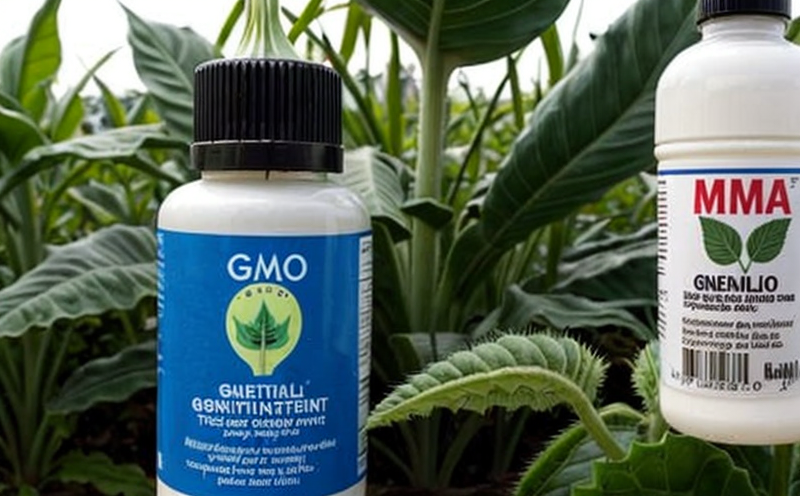ISO 25890 GMO Detection in Sugar Beet Products
The demand for genetically modified organisms (GMOs) testing is increasingly important as consumers become more aware of the origin and composition of food products. In sugar beet products, ensuring compliance with international standards like ISO 25890 can enhance a company's reputation and ensure it meets regulatory requirements. This service focuses on identifying specific GMOs in sugar beet products using advanced molecular techniques.
ISO 25890 is an internationally recognized standard that provides guidelines for the detection of genetically modified organisms (GMOs) in foodstuffs, including sugar beets. The testing process involves several critical steps, from sample collection and preparation to analysis and reporting. This service ensures accurate identification and quantification of GMOs present in sugar beet products.
The procedure typically begins with the collection of representative samples from various sources such as fields or processing plants. These samples are then prepared for genetic analysis by extracting DNA. The extracted DNA undergoes polymerase chain reaction (PCR) amplification, followed by restriction enzyme digestion and gel electrophoresis to differentiate between GMOs and non-GMO varieties.
Once the preliminary steps have been completed, the results are analyzed using specialized software tools. This step is crucial in ensuring accurate identification of any genetically modified components present in the sugar beet samples. The final report includes detailed information about the types of GMOs detected, their concentration levels, and compliance with relevant international standards.
Our team of experts uses cutting-edge technology to ensure precise detection rates, which are essential for maintaining product integrity and consumer confidence. By adhering strictly to ISO 25890 guidelines, we provide reliable data that helps businesses comply with local regulations while also meeting customer expectations regarding GMO content in their products.
In addition to providing accurate results, this service offers valuable insights into the potential presence of unintended or unapproved GMOs within sugar beet products. This knowledge can be used by companies to improve labeling practices and develop strategies aimed at enhancing overall quality control processes throughout supply chains.
By leveraging ISO 25890-compliant methods for detecting GMOs in sugar beet products, organizations not only meet regulatory obligations but also demonstrate their commitment to transparency and sustainability. This approach fosters trust among stakeholders by ensuring that the information provided about product contents is accurate and reliable.
Applied Standards
| Standard | Description |
|---|---|
| ISO 25890:2017 | This standard specifies the methodologies for detecting genetically modified organisms (GMOs) in foodstuffs, including sugar beets. It outlines procedures for sample preparation, extraction of DNA, PCR amplification, restriction enzyme digestion, and analysis via gel electrophoresis. |
| ASTM E2567-18 | American Society for Testing Materials (ASTM) standard that provides additional guidance on the performance of GMO detection tests in agricultural products like sugar beets. While not mandatory, it complements ISO 25890 by offering more detailed procedures related to specific analytical techniques. |
| EN 16734:2016 | An European Norm providing supplementary information on the detection of GMOs in food and feed. Similar to ASTM E2567-18, this standard offers complementary details that enhance understanding of the testing process. |
| IEC 63940:2017 | This international standard focuses on ensuring consistency across different laboratories performing GMO analyses. It sets out best practices for quality assurance measures and inter-laboratory comparisons to maintain high standards in GMO detection. |
Environmental and Sustainability Contributions
By adhering strictly to ISO 25890 guidelines, we contribute positively towards environmental protection and sustainable practices. Detecting GMOs helps prevent the accidental release of genetically modified organisms into natural ecosystems, thereby reducing risks associated with biodiversity loss.
Our service also supports sustainable agriculture by assisting farmers in making informed decisions regarding crop choices based on their intended use or market requirements. This ensures that both conventional and GM crops are appropriately handled throughout production cycles, minimizing adverse impacts on the environment.
The accurate identification of GMOs through this service enables producers to comply with international regulations concerning labeling transparency. This promotes responsible consumption habits among consumers who increasingly seek out information about the origins of their food products. Thus, our work contributes significantly to fostering a more sustainable and informed global food system.
Competitive Advantage and Market Impact
Maintaining compliance with international standards like ISO 25890 can give businesses a significant competitive edge in the marketplace. Consumers are becoming more discerning when it comes to what they purchase, particularly regarding genetically modified organisms (GMOs). By ensuring that your company adheres strictly to these regulations, you demonstrate your commitment to transparency and quality control.
Compliance with ISO 25890 also helps protect your brand reputation by avoiding potential legal issues or negative publicity related to non-compliance. In today's highly regulated environment, being able to prove that your products meet all necessary standards can be crucial for maintaining market access and customer loyalty.
In addition, this service provides businesses with valuable data about the presence of GMOs in their sugar beet products. This information can inform strategic decisions regarding future product development or adjustments to existing offerings. Understanding the genetic makeup of your raw materials allows you to tailor production processes more effectively, potentially leading to cost savings and improved efficiency.
Furthermore, by staying ahead of regulatory changes and industry trends related to GMOs in sugar beet products, companies can position themselves as leaders in sustainability practices. This proactive stance can attract eco-conscious consumers who prioritize ethical sourcing and responsible manufacturing methods when making purchasing decisions.





